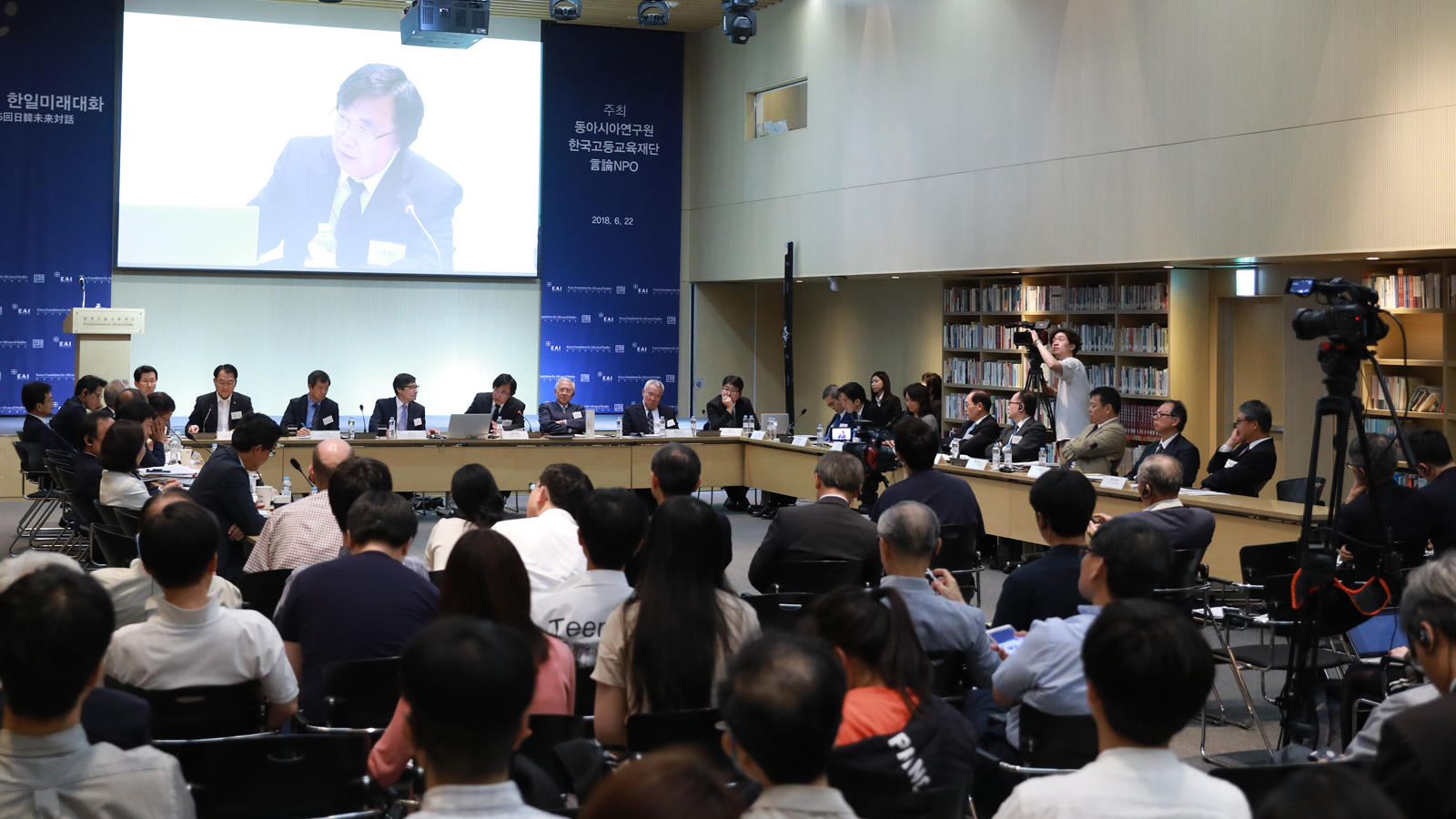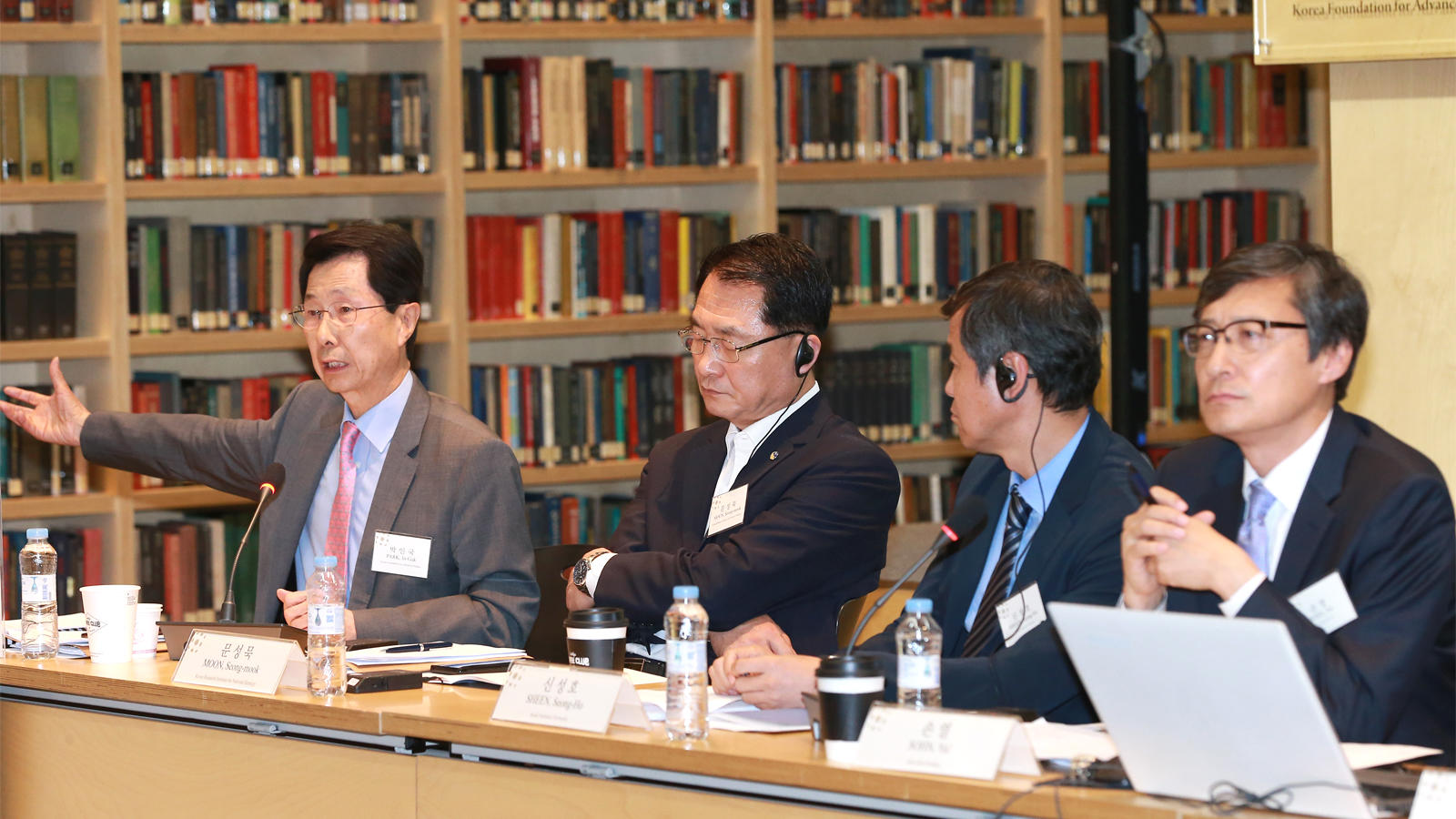The 6th Japan-Korea Future Dialogue involving experts and the general public in an open civic-level discussion on issues concerning Japan and South Korea was held June 22 in Seoul. It was the first high-level civic discussion to take place after the historic meeting between leaders of the United States and North Korea. Topics for the discussion, involving some 20 experts from Japan and South Korea, ranged from North Korea's denuclearization to the future of the Japan-South Korea relationship and peace on the Korean Peninsula, as well as in Northeast Asia. The first open session started with an evaluation of this year's Japan-South Korea joint opinion poll.
Stark differences between Japanese and South Korean views
Sohn Yul, president of the East Asia Institute (EAI) in Seoul explained that the most notable trend in this year's survey results is the gap in views of Japanese and South Korean respondents on a variety of issues. In particular, while 65.1% of Japanese feel a resolution of North Korea's nuclear issue will be difficult, only 23.2% of South Koreans feel the same, a drastic drop from last year's 71.3%. Given such differences in perception, Sohn argued that Japan and South Korea must engage in serious debate about how to build peace on the Korean Peninsula and in Northeast Asia.
Yasushi Kudo, president of Japan's The Genron NPO, pointed out that the Japanese are pessimistic about the North Korean nuclear issue and the future of the Korean Peninsula compared to Americans as well, as the recent joint survey between Japan and the United States shows. One reason is because Japan is not directly involved in the negotiations and hence may be feeling relatively "distant" about recent events, Kudo said. He also pointed out insufficient local media coverage because of Japan's alienated status. "If the government was the negotiator, it would be explaining the results to the media, and the media would deliver them to the general public, but without any information from the government, the media can only collect information from the periphery," Kudo said. He, however, said that the situation was not hopeless, as people of both countries are aware of the need to cooperate and what was necessary was to continue the dialogue between the two countries.

How to bridge the perception gap for a new Japan-South Korea relationship
Junya Nishino, a professor of political science at the Faculty of Law and Politics, Keio University, said that the Korean War will most likely be officially declared over within this year and the Northeast Asia region will start to move toward building a new order. "Now is the time to embed a new Japan-South Korea relationship within the new order," Nishino said.
While negative sentiment among South Koreans against Japan is slowly showing signs of abating, Japanese continue to feel uncertain about the future of bilateral relations, which makes it difficult for Japan to envision a bright future with its neighbor, Nishino said. He also pointed out that the respondents of both countries have a slightly different understanding of security cooperation between Japan, South Korea and the United States, with Japan envisioning a militaristic "deterrent" while the Koreans see it more as an "engagement," and that a positive response to this issue in the survey does not necessarily serve as a basis for the possibility of expanded cooperation between the two countries.
Active strategic dialogue needed to bridge the perception gap
Cho Se-young, director of the Japan Center at Dongseo University, said that while the Korean side needed to understand Japan's reluctance to believe in a positive future, the Japanese side also needs to appreciate that the South Korean government's recent moves regarding the "comfort women" issue is more directed toward addressing international calls for human rights than toward Japan. He added that the participation of China and Russia was indispensable to build order in Northeast Asia, and with Japan and South Korea having different views on their relationship with Beijing and Moscow, the two countries needed to engage in active strategic dialogue to iron out the differences.
Tokyo and Seoul need to openly cooperate to create order based on rules
Lee Sook-jong, a professor at Sungkyunkwan University and former president of the EAI, identified "stability on the Korean Peninsula" and "building order based on rules in the Asia-Pacific region" as keys to expanding bilateral cooperation between Tokyo and Seoul. Denuclearization, economic development and the stability of North Korea would involve a very long process, and Japan needs to play a major role to realize them, Lee said. As for building a new order in the region, Lee said as the United States withdraws from Asia, China will vie to take its place, so Japan and South Korea should try to involve Beijing to openly build a new order based on rules.
Hiroki Sugita, executive director of Kyodo News Agency, said Japan and South Korea were able to develop because of the fruits of an order based on rules, and the two countries needed to continue to support such an order. He expressed concern that the joint survey failed to show the respondents of both countries sharing the universal value of democracy, and with global signs of democracy being undermined, the intellectual community of both countries must take concrete action to protect this universal value.
What should the political leaders and media do?
Shim Kyun-sun, a professor at Seoul National University and former managing editor of South Korean newspaper Dong-A Ilbo, said that in the past, political leaders were intent on reflecting the sentiment of their people, but the kind of leader we need now is someone who is able to convince the people from a broader perspective, even if it may not sound pleasing to the general public in the short term. Similarly, the media also needs to change its style from blind attacks on opponents to engaging in dialogue and persuasion.
Yasuyo Sakata, a professor at the Department of International Communication, Kanda University of International Studies, said the bilateral relationship between Tokyo and Seoul will not mature unless the people realize the strategic significance of maintaining good relations. One way to do that would be to see the leaders of both countries make use of the media in each other's country to explain their visions, or engage in direct dialogue with the citizens of Japan and South Korea.
Park In-guk, president of the Korea Foundation for Advanced Studies, also noted that people who rely on mobile devices appear to have a better impression of their counterparts, and that both countries needed to take advantage of these new forms of media. He concurred with Sakata's suggestion to have leaders appear in the media, citing the recent example of how the South Koreans now have a better impression of North Korean leader Kim Jong Un (AP Style has N. Korean names as three separate words) after his meeting with South Korea President Moon Jae-in was televised live on South Korean media. "If their impression of Kim can improve, I'm sure Prime Minister Abe's impression can greatly improve," he said.

What is the fundamental cause of the perception gap?
Katsumi Sawada, managing editor of the Foreign News Department of Mainichi Shimbun newspapers in Japan, said another factor contributing to the failure to see any improvement in sentiment toward each other is the diminished difference in the national strength of both countries. The Japanese are more easily insulted by criticism that they used to be able to ignore in the past. He also pointed out that while South Korea's presidential political system makes it easy for the country to drastically change its foreign policy when a new administration takes over, the Japanese people do not fully comprehend the mechanism, causing them to harbor misgivings about Moon Jae-in. "How can we overcome this difference in perception? Without addressing this issue head-on, nothing will lead to a fundamental resolution, even if exchanges between the leaders of the two countries become more active," he said.
For Japan and South Korea to become true partners
Nobuya Takasugi, former chairman and CEO of Fuji Xerox Korea who worked in South Korea for 19 years, urged Japan and South Korea to move further than a mere bilateral relationship, and seek to become partners that can contribute to the development of Asia and the world. But he was dissatisfied with South Korea for sometimes waging a "morality war" during economic and cultural exchanges, saying the relationship will not move forward if this habit continues.
Shin Kawashima, a professor at the Graduate School of Arts and Sciences of Tokyo University, said as democratic countries, the surveys and dialogues should not only serve to offer advice to governments but be conducted from the perspective of how to build a relationship between the citizens of Japan and South Korea, as well as how to build a consensus within the general public.
Yun Byeong-nam, a professor at Sogang University, shared his experience of taking his students to Japan and how their impressions of the country have changed as a result. Direct contact provides positive influence not just on the people, but also on culture, lifestyle and way of thinking, Yun said, concluding that expanding exchanges was the classic but surest way to improve bilateral relationships.




Post a comment